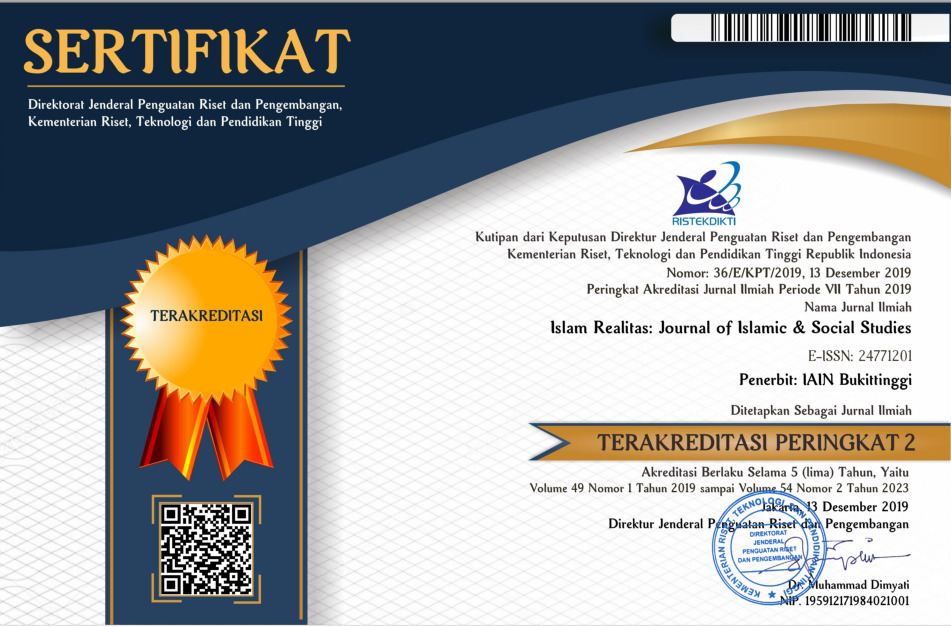Ethical Philosophical Values in the Short Story "God Sees the Truth, But Waits" by Leo Tolstoy
DOI:
https://doi.org/10.30983/fuaduna.v7i1.6225Keywords:
Value, Ethical, Philosophical, Short Story.Abstract
References
Abadi, T. W. (2016). Aksiologi: Antara Etika, Moral, dan Estetika. KANAL: Jurnal Ilmu Komunikasi, 4(2), 187–204. https://doi.org/10.21070/kanal.v4i2.1452
Admin. (2021). Kuliah Umum Haedar Nashir: al-Islam dan Kemuhammadiyahan sebagai Nilai Keluhuran dalam Memajukan Kehidupan. Article. https://www.umm.ac.id/id/berita-ilmiah/kuliah-umum-haedar-nashir-alislam-dan-kemuhammadiyahan-sebagai-nilai-keluhuran-dalam-memajukan-kehidupan.html
Archer, D. J. (1985). Tolstoy’s God Sees the Truth, But Waits : A Reflection. Religious Studies, 21(1), 75–89. https://doi.org/10.1017/S0034412500016905
Bastian, A., Rasyid, R. E., & Yusmah, Y. (2020). Wujud Nilai Moral dalam Novel Surat Kecil untuk Tuhan Karya Agnes Davanor. Cakrawala Indonesia, 5(2), 38–43. https://doi.org/https://doi.org/10.55678/jci.v5i2.472
Dusar, B., & Zain, G. (2000). Akhlak dalam Berbagai Dimensi. IAIN IB Press.
Kurnia, T. R. (2021). Seni Mural di Kecamatan Majalaya: Tinjauan Filsafat Seni Leo Tolstoy. Jurnal Riset Agama, 1(3), 701–715. https://doi.org/http://dx.doi.org/10.15575/jra.v1i3.15594
Larasati, P., & Irmawati, N. D. (2022). A Sociological Approach of Literature in Leo N. Tolstoy’s Short Story God Sees the Truth, But Waits. EduLite: Journal of English Education, Literature and Culture, 7(1), 137–147. https://doi.org/10.30659/e.7.1.137-147
Libon, Y., & Sadwika, I. N. (2019). Kritik Sosial dalam Kumpulan Cerpen Lelucon Para Koruptor Karya Agus Noor. Stilistika, 8(1), 65–77. https://doi.org/https://doi.org/10.59672/stilistika.v8i1.578
McLean, H. (2008). Could the Master Err? A Note on “God Sees the Truth but Waits. In Quest of Tolstoy (pp. 87–95). Academic Studies Press. https://doi.org/https://doi.org/10.1515/9781618116802-007
Mustary, E. (2021). Pemaafan dan Kesejahteraan Psikologis Individu. Indonesian Journal of Islamic Counselling, 3(2), 70–75. https://doi.org/https://doi.org/10.35905/ijic.v3i2.4846
Nasution, W. (2016). Kajian Sosiologi Sastra Novel Dua Ibu Karya Arswendo Atmowiloto: Suatu Tinjauan Sastra. Metamorfosa, 4(1), 2016. https://ejournal.bbg.ac.id/metamorfosa/article/view/138
Nurhayati, I., Sa’ari, M. H., Firmanulloh, M. D., & Hermansyah, S. (2023). Konsep Keadilan dalam Perspektif Plato. Jurnal Pendidikan, Seni, Sains, Dan Sosial Humaniora, 1(1). https://journal.forikami.com/index.php/nusantara/article/view/135
Pradana, S. (2021a). 7 Fakta tentang Leo Tolstoy Sang Sastrawan Besar dari Rusia. Artikel. https://www.idntimes.com/science/discovery/shandy-pradana/7-fakta-tentang-leo-tolstoy-c1c2?page=all.
Pradana, S. (2021b). 7 Penulis Hebat yang Tidak Pernah Memenangkan Nobel Sastra, Miris! Artikel. https://www.idntimes.com/science/discovery/shandy-pradana/penulis-hebat-c1c2.
Pradopo, R. D. (1989). Konkretisasi Sastra. Jurnal Humaniora, 1, 130. https://doi.org/http://dx.doi.org/10.22146/jh.2366
Praja, J. S. (2020). Aliran-aliran Filsafat dan Etika. Kencana.
Rachmawati, D. L. (2014). Leo Tolstoy’s Idea of Morality in His Short Stories Character. Litera Kultura: Journal of Literary and Cultural Studies, 2(2), 1–18. https://doi.org/https://doi.org/10.26740/lk.v2i2.8757
Rokhmah, D. (2021). Ilmu dalam Tinjauan Filsafat: Ontologi, Epistemologi, dan Aksiologi. CENDEKIA: Jurnal Studi Keislaman, 7(2), 172–186. https://ejurnal.staiha.ac.id/index.php/cendekia/article/view/124
Romadhon, I. F., & Riskiyah, F. (2022). Hubungan Karya Sastra dan Filsafat. Jurnal Tifani, 2(2), 57–62. http://www.tifani.org/index.php/tifani/article/view/31/23#
Rosnawati, R., Ahmad Syukri, A. S., Badarussyamsi, B., & Ahmad Fadhil Rizki, A. F. R. (2021). Aksiologi Ilmu Pengetahuan dan Manfaatnya Bagi Manusia. Jurnal Filsafat Indonesia, 4(2), 186–194. https://doi.org/10.23887/jfi.v4i2.35975
Sandur, S. (2020). Etika Kebahagiaan: Fondasi Filosofis Etika Thomas Aquinas. Kanisius.
Saragih, A. K., Manik, N. S., & Br Samosir, R. R. Y. (2021). Hubungan Imajinasi dengan Karya Sastra Novel. Asas: Jurnal Sastra, 10(2), 100–110. https://doi.org/10.24114/ajs.v10i2.26274
Sianipar, A. R., & Jusmaya, A. (2019). The Unfulfilled Love and Belonging Needsfound By the Main Character in “Anna Karenina†By Leo Tolstoy: Psychological Approach. Scientia Journal: Jurnal Ilmiah Mahasiswa, 1(2). https://ejournal.upbatam.ac.id/index.php/scientia_journal/article/view/2516
Subekti, M., & Khoeruman, H. F. (2017). Pembacaan Ulang Nana Karya Zola dan Anna Karya Tolstoy : Re-Interpretasi Sosok Perempuan Feminis Abad-19. Metahumaniora, 7(3), 273–292. https://doi.org/10.24198/metahumaniora.v7i3.18845
Sugiarti, & Andalas, E. F. (2018). Perspektif Etik dalam Penelitian Sastra: Teori dan Penerapannya. https://eprints.umm.ac.id/45797/1/Sugiarti Andalas - Perspektif Etik dalam Penelitian Sastra.pdf.
Susanto. (2019). Filsafat Ilmu: Suatu Kajian dalam Dimensi Ontologis, Epistemologis dan Aksiologis. PT Bumi Aksara.
Tolstoy, L. (2020). God Sees the Truth, But Waits. Terj. Indonesia Tuhan Tahu, Tapi Menunggu. Basabasi.
Uktamovna, K. D. (2022). The Role of the East in the Life and Creative Activity of Leo Tolstoy. Oriental Renaissance: Innovative, Educational, Natural and Social Sciences, 2(3), 463–468. https://cyberleninka.ru/article/n/the-role-of-the-east-in-the-life-and-creative-activity-of-leo-tolstoy/viewer
Yusanta, F. B., & Wati, R. (2020). Eksistensi Sastra Cyber: Webtoon dan Wattpad menjadi Sastra Populer dan Lahan Publikasi bagi Pengarang. Jurnal Literasi, 4(2). https://doi.org/http://dx.doi.org/10.25157/literasi.v4i1.3080
Downloads
Published
How to Cite
Issue
Section
Citation Check
License
Copyright (c) 2023 Pismawenzi, Jamaldi, Endrika Widdia Putri

This work is licensed under a Creative Commons Attribution-ShareAlike 4.0 International License.
Authors who publish with this journal agree to the following terms:
- Authors retain copyright and grant the journal right of first publication with the work simultaneously licensed under a Creative Commons Attribution-ShareAlike 4.0. that allows others to share the work with an acknowledgment of the work's authorship and initial publication in this journal.
- Authors are able to enter into separate, additional contractual arrangements for the non-exclusive distribution of the journal's published version of the work (e.g., post it to an institutional repository or publish it in a book), with an acknowledgment of its initial publication in this journal.
- Authors are permitted and encouraged to post their work online (e.g., in institutional repositories or on their website) prior to and during the submission process, as it can lead to productive exchanges, as well as earlier and greater citation of published work (See The Effect of Open Access).





